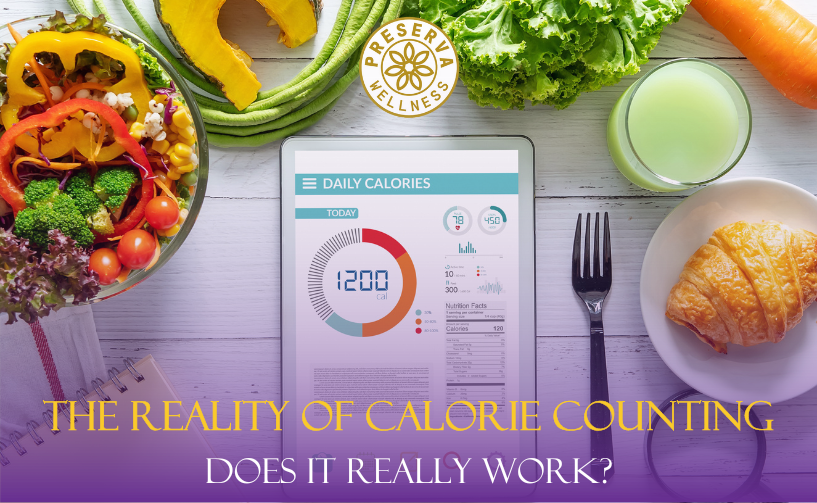If you’re on a journey to shed some pounds or just curious about maintaining a healthier lifestyle, chances are you’ve encountered the debate around calorie counting. Some hail it as the ultimate solution for weight management, while others dismiss it as outdated and ineffective. So, where does the truth lie? Let’s delve into the science to uncover whether calorie counting truly works.
Understanding Calories
Before diving into the effectiveness of calorie counting, it’s essential to grasp what a calorie is and how our bodies utilise it. A calorie is a unit of energy that represents the amount of heat required to raise the temperature of one gram of water by one degree Celsius.
In the context of nutrition, calories are the energy we derive from the foods we consume. They power essential bodily functions like breathing, digestion, and physical activity. Carbohydrates, proteins, fats, and alcohol are the primary sources of calories in our diet, each contributing a different amount of energy per gram.
Calories and Energy Expenditure: How Your Body Utilises Energy
Your body utilises calories from three primary macronutrients: carbohydrates, proteins, and fats. Each gram of carbohydrate or protein provides approximately 4 calories, while a gram of fat yields around 9 calories. Additionally, alcohol contributes 7 calories per gram.

These calories fuel three main processes:
- Basic Metabolism: Your body expends the majority of calories on essential functions like brain activity, organ function, and cellular maintenance, known as Basal Metabolic Rate (BMR) or Resting Metabolic Rate (RMR).
- Digestion: A portion of consumed calories is used in the digestion and metabolism of food, known as the thermic effect of food (TEF).
- Physical Activity: The remaining calories support everyday tasks and exercise, comprising your total daily energy expenditure.
Calories in vs. Calories out
The notion of weight loss often boils down to a simple equation: calories in versus calories out. When we consume more calories than our bodies expend, the excess is stored as fat, leading to weight gain. Conversely, a calorie deficit—wherein we consume fewer calories than we burn—results in weight loss, primarily from fat stores.
Not All Calories Are Created Equal
While the calorie balance equation seems straightforward, the quality of the calories we consume matters. A hundred calories from an apple and a hundred calories from a donut may have the same energy content, but their impact on our health differs significantly. Nutrient-dense foods like fruits and vegetables offer essential vitamins, minerals, and fibre, promoting overall well-being. In contrast, highly processed foods laden with sugar and refined carbs can wreak havoc on our health and hunger levels, potentially leading to overeating.
Does Calorie Counting Work?
The effectiveness of calorie counting hinges on several factors. Firstly, tracking your caloric intake can provide valuable insights into your eating habits, helping you identify areas for improvement. Additionally, maintaining a food diary can serve as a visual reminder of your dietary choices, fostering mindfulness and accountability. Studies have shown that individuals who track their food intake are more likely to achieve their weight loss goals compared to those who don’t.
Moreover, calorie counting offers a structured approach to weight management, enabling individuals to monitor their calorie intake and adjust accordingly to meet their goals. Whether you prefer traditional pen-and-paper methods or opt for digital apps, finding a tracking method that suits your lifestyle is key to success.
However, it’s essential to recognise that calorie counting isn’t a one-size-fits-all solution. For some individuals, meticulously tallying every calorie consumed can lead to obsessive behaviours and an unhealthy relationship with food. This is especially true for those with a history of disordered eating, as calorie tracking may exacerbate symptoms and perpetuate negative thought patterns.

The Downside of Calorie Counting
While calorie counting can be an effective tool for weight management, it’s not without its drawbacks. Research suggests that constant monitoring of food intake and body weight may contribute to increased levels of stress and anxiety, particularly among individuals prone to eating disorders. Moreover, the focus on numerical values may overshadow the importance of intuitive eating and listening to your body’s hunger cues.
Exploring Alternatives
For those who find calorie counting challenging or triggering, alternative approaches to weight management may be worth exploring. Intuitive eating, for instance, emphasises listening to your body’s hunger and fullness cues rather than adhering to strict dietary rules or calorie targets. By tuning into your body’s signals and honouring its needs, intuitive eating can promote a healthier relationship with food and a more sustainable approach to weight management.
Furthermore, focusing on overall dietary patterns rather than individual calorie counts may offer a more holistic approach to nutrition. The Mediterranean diet, for example, emphasises whole foods like fruits, vegetables, whole grains, lean proteins, and healthy fats while minimising processed and sugary foods. By adopting a balanced and varied diet rich in nutrient-dense foods, you can nourish your body while naturally moderating calorie intake.
Conclusion
In the ongoing debate over the effectiveness of calorie counting, the truth lies somewhere in between. While calorie counting can be a valuable tool for some individuals seeking to manage their weight, it’s not the only path to success. The key lies in finding an approach to nutrition that aligns with your individual preferences, needs, and goals.
Whether you choose to track your calories diligently or adopt a more intuitive approach to eating, the most essential factor is to prioritise your health and well-being. Listen to your body, nourish it with wholesome foods, and cultivate a positive relationship with food. And remember, achieving a healthier lifestyle is a journey, not a destination—embrace the process, celebrate your successes, and be kind to yourself along the way.






